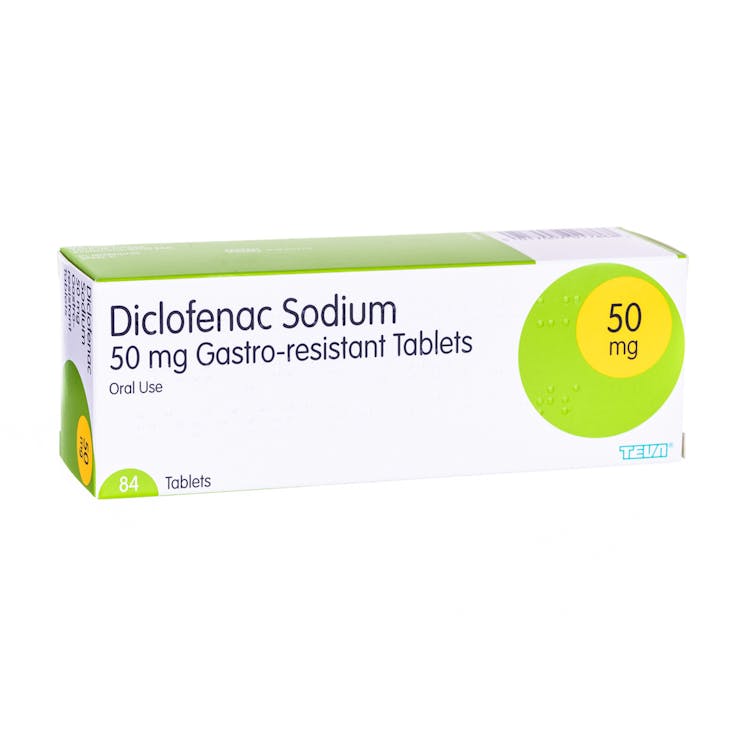Diclofenac
Images à titre indicatif uniquement
Diclofenac is a pain killer that is regularly prescribed to reduce pain or swelling. It is part of the medicines group known as Non-Steroidal Anti-Inflammatory Drugs (NSAIDs). Other medications in this group include ibuprofen.
- Relieves pain
- Reduces swelling and inflammation
- Helps to ease joint stiffness
- Genuine medication
- Shipped from EU Pharmacies
Plus d'informations
Diclofenac tablets
What is Diclofenac?
- Diclofenac helps to reduce pain and swelling in a number of conditions
- It may be prescribed for arthritis, period pain, toothache and even after operations to minimise pain and discomfort
- It is available in several forms including tablets, capsules, suppositories, skin gels or mouthwash
- It is not suitable for everyone, including those with stomach ulcers or asthma
- It is important to read the patient leaflet for a full list of side effects and cautions.
How Does Diclofenac Work?
Prostaglandins are produced by the body, but they cause pain and inflammation at the site of an injury or damage. Diclofenac prevents prostaglandins from being made by blocking cyclo-oxygenase (COX) enzymes. Taking diclofenac therefore blocks the biological pathway that causes pain and swelling.
What is the proper dosage of Diclofenac?
The usual dosage of diclofenac tablets is 75mg to 150mg each day. Your prescriber will advise you on how many times you should take a tablet each day. Often, diclofenac is taken two or three times daily.
How is Diclofenac Taken?
Diclofenac can be taken in a number of ways. Tablets and capsules should be swallowed whole with a glass of water. To avoid stomach irritation, it is best to take them with a meal or snack.
As diclofenac gels and creams can be applied directly to the area of pain, they are particularly useful for easing muscular pains and strains. Using diclofenac topically reduces the amount of the medication in the body, which in turn reduces the risk of side effects. Diclofenac gel should be applied exactly where it is needed, and slowly rubbed in. Be sure to wash your hands after applying the gel.
Suppositories should be gently inserted into the back passage (anus). It is normal for the suppository to melt inside the back passage.
Diclofenac can be taken as a quick release preparation that offers immediate pain relief. However, a sustained release preparation may be more suitable for those who need to keep on top of long term pain.
Some diclofenac preparations also contain misoprostol. Misoprostol helps to protect the stomach against irritation. It is particularly useful when taking diclofenac long term, for example to manage the discomfort and inflammation associated with arthritis.
Are there any side effects to Diclofenac?
Like all medications, diclofenac can have some side effects. Common side effects include:
- Headaches
- Dizziness
- Stomach ache or reduced appetite
- Nausea or vomiting (feeling sick or being sick)
- A mild rash
- Skin irritation at the site of diclofenac gel use.
If these side effects bother you or persist, speak to a healthcare professional.
Rarely, more serious side effects can occur. You should call your doctor straight away if you experience:
- Blood in your vomit or stool (poo), or black stools
- Severe indigestion or stomach pain
- Diarrhoea or vomiting
- Yellowing of the skin or whites of the eyes
- Raised or itchy rash
Call 999 if you experience:
- Breathlessness, swollen legs or ankles – these could be signs of heart failure
- Chest pain, breathlessness, or a feeling of anxiety or impending doom – these could be a sign of a heart attack
- Weakness, change in speech, blurred eyesight or loss of balance – these could be caused by a stroke.
If you have a severe allergic reaction (anaphylaxis) including breathlessness, lip or tongue swelling, call 999 immediately.
Does Diclofenac come with any warnings?
Diclofenac is not suitable for everyone. Make sure you tell your prescriber if you have:
- Ever had an allergic reaction to a medication, including aspirin or other NSAIDs such as ibuprofen or naproxen
- Asthma
- Stomach ulcers
- High blood pressure
- Heart failure
- Liver disease
- Kidney disease
- Crohn’s disease or ulcerative colitis
- Lupus
- Problems with blood clotting.
You should also tell your prescriber if you are pregnant or trying to conceive, as there may be a different pain relief medication that would be more suitable.
Buy Diclofenac
Where can I buy Diclofenac online?
You can safely buy Diclofenac online at EU Meds. During your consultation with EU Meds, you will be asked to complete a health questionnaire to check that diclofenac is suitable for you. A prescriber from EU Meds will also review your current medications, including any herbal remedies or supplements, to ensure that diclofenac will not interact with them.
Once prescribed, you can order diclofenac online for home delivery.

Ici pour vous aider
Our Customer Service is available Monday to Friday 9am - 4pm. If you need urgent assistance, do not use this service. Call 111, or in an emergency call 999. Visit our help section



